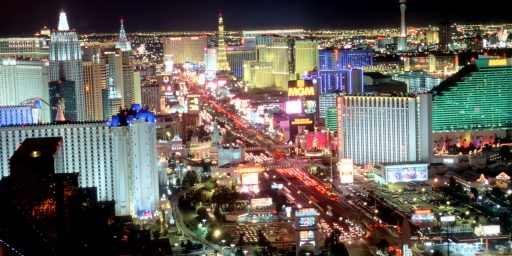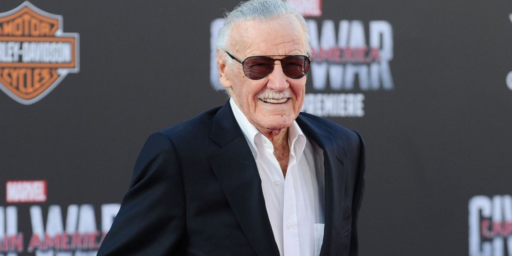Larry Sabato’s Ubiquity
Charles Mahtesian thinks the amount of exposure Larry Sabato gets is ridiculous.
Governing magazine’s Josh Goodman has an interesting blog item about the media’s over-reliance on political scientist Larry Sabato, the University of Virginia’s Quotemeister General. Goodman counted the number of states where reporters cited Sabato in 2006 and found that the pundit-professor had been quoted in at least 46 states and the District of Columbia, a figure that does not include syndicated columns or wire-service articles.
All told, Sabato appeared in hundreds of print stories last year alone, on subjects ranging from CBS news anchor Katie Couric’s declining ratings to the potential execution of a man who converted to Christianity in Afghanistan. Goodman concludes that “over-stretched journalists tap Sabato as an easy source because they lack the time or wherewithal to cultivate relationships with insiders.”
Goodman is too gracious to say so, but his research suggests that there are far too many lazy reporters and at least a few scribes who have but a facile feel for their beats. Sabato is both witty and weighty, and he knows American politics as well as anyone. But can’t reporters find anyone else?
The reality is that dozens of top-flight political scientists churn out fascinating politics and elections research on a regular basis. Of course, not all of them give good interviews like Sabato—nor are they as diligent and courteous about returning calls before deadline—but even so, many states have at least one pundit-professor type who can speak to both the home state and national political scene. A few even showcase their talents in blogs such as Political Arithmetik and GraniteProf.
Still, time and again, reporters turn to Sabato. According to Sabato’s own website, he “is the most cited college professor in any field in the United States by national and regional news organizations, electronic and print.” In 2004-2005, he logged “nearly 200 television appearances, including multiple appearances on [national TV shows and networks].”
That Sabato is being cited with amazing frequency does not mean others aren’t. When I was teaching political science at Troy State, I gave frequent interviews to the local press. My former colleague, Steven Taylor, has become a regular guest on Alabama Public Television.
Indeed, as one of (then) two local political scientists, we were frequently called upon to expound on matters outside our expertise. I spent election night 1998 doing commentary for a Montgomery radio station, even though I likely knew less about the local races than the show’s host, who had been covering Alabama politics for years. But, because I had “Dr.” in front of my name, I was the “expert.”
So it is with Larry Sabato or virtually any other frequent talking head. People who are quick with a quote and willing to drop everything at the drop of a hat to spend three hours to get two minutes of air time will secure a prominent place in the Rolodex. Genuine expertise is a nice bonus, at first, but the parameters gradually expand so that anything even remotely within your sphere is close enough.
Is this laziness on the part of reporters and producers? In part. But there’s something else: familiarity. The audience enjoys hearing from people they know and trust.
In the case of local reporters, too, there’s a certain thrill in getting a quote from a Sabato or other national quasi-celebrity. Even if the local college professor has equal or greater knowledge about the story–and is interviewed and quoted in the story–tossing in a quote from Sabato makes it look as if the reporter went the extra mile.
It’s also worth noting that some substantial number of those Sabato quotes were likely pulled from the Web or the wire and added into the local story as if the reporter had interviewed him. Oftentimes, quotes in press accounts are taken from other sources with casual attribution.





I always assumed that Sabato was a relatively objective political science commentator. That is, until he interjected himself in a very personal, questionable, and apparently partisan fashion into the Webb/Allen election. I haven’t heard one mention of that incident since the initial media swarm. Shouldn’t his conduct justifiably undermine his status as the media’s “go-to” academic for objective political commentary?
Im not sure putting yourself in the same league as Sabato is appropriate. Larry was a Rhodes scholar, has written 20 books–nearly all of which have been on campaigns and elections. He is also the director of a major research center at one of the top research institutions in the country.
The laziness is not in reporters contacting Sabato for analysis–but rather in media outlets contacting people who admit that “they know less about local races.”
More insidious is the fact that idiots with absolutely no expertise about political analysis, foreign affairs, public policy like Morton Kondrackie, John McLauglin, or Chris Matthews are elevated to the status of informed observers.
Sabato is a genuine scholar and expert.
Triumph,
My point there was to rebut the idea that, just because Sabato is being called on for quotes, others are being ignored.
Sure, Sabato is a genuine expert on electoral politics. As the piece notes, though, he is frequently called upon for commentary well outside his expertise. That’s just the nature of punditry, though. Sabato isn’t a pure political scientist anymore; he’s a talking head who’s also a scholar.
Kondrackie, McLauglin, and Matthews have spent decades reporting and commenting on public policy issues and spend hours each week talking to the top policymakers and other experts. Like everyone in the game, they have to talk about too many issues to be genuinely knowledgeable on all of them, but their insights are not meaningless blather.
Sabato is in agreement with the Washington and network media. As long as he supports their contentions they will go to the well as often as possible.